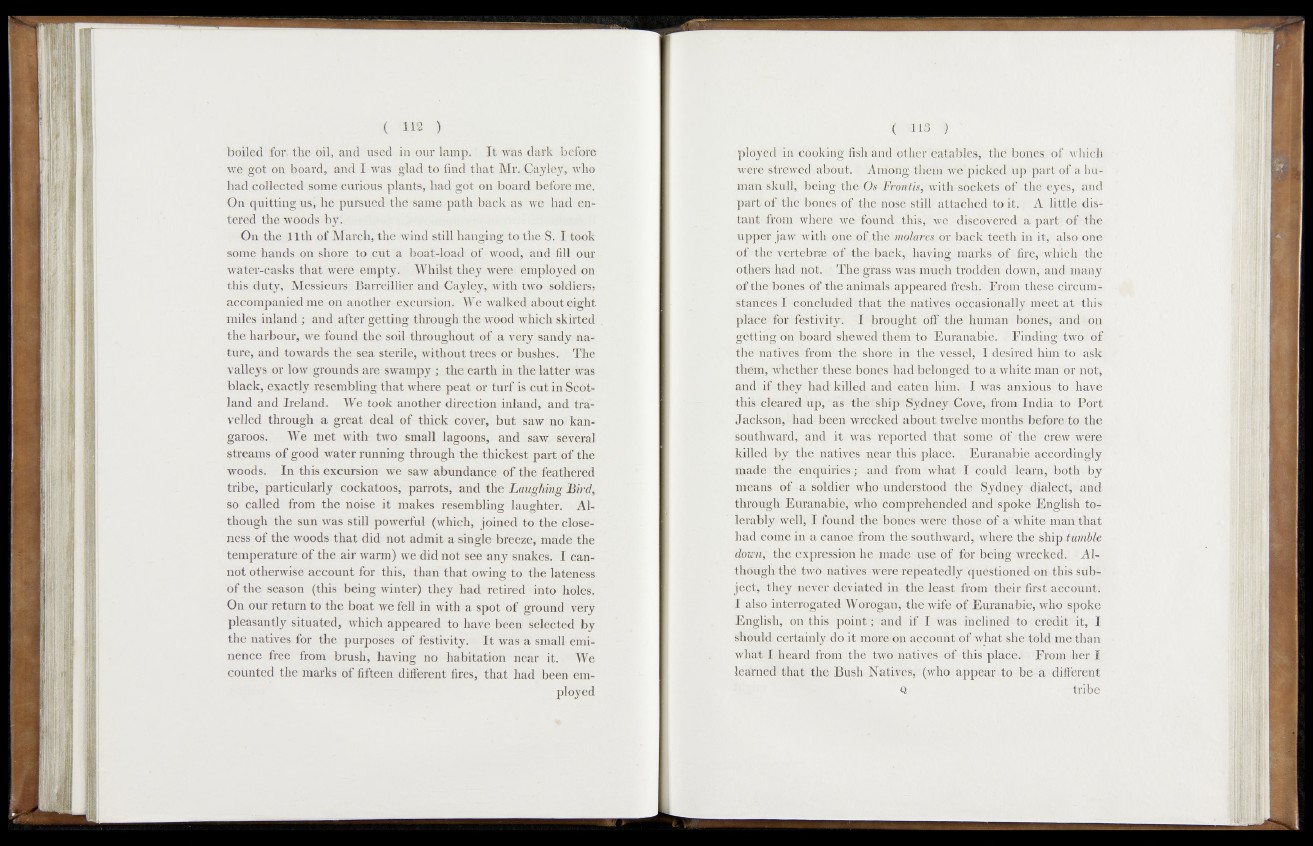
( u |
boiled f|||itlle oil, and used in our lamp. It was dark before
we got op board, and T was glad to find that Mr^Qayley,, who
bad colleoted- some-eurious plants, had got on fopiard beforpme.
On quittingbs j he porsned^ the same path back as we had entered
the woods by.r
On the 11 th of March, the wind still hanging jto the Si-1 took
some hands on s h o r e . c u t a boat-load of wood, and fill our
Water-casks thatL were empty. : Whilst they-were employed on
this duty, Messieurs, Marreiltier and Cayley,: with twe«soldiers>
accompanied me on another excursion. We walked, abottfeeight
miles inland; and after getting;ithrough the wood which skirted
the harbour, we found the soil throughout of a verylsandp nature,
and towards, the sea sterile, without trees or bushes. The
valleys Or low grounds ares swampy ; the earth in the latter was
black, exactly resembling that where peat or turf is cut in Scotland
and Ireland. We took another direction inland.and • travelled
through a great deal of thick cover, but saw no kangaroos.
We met with two small lagoons, and saw, several
Streams o f good water running through the thickest part of the
Woods. In this excursion we saw abundance of the feathered
tribe, particularly cockatoos, parrots, and tfocLaugMiig Bird,
so called from the noise it makes resembling lamghtef. 1 Al-
though the sun was still powerful (which, joinelrtoithe clPS^
ness of the woods that did not admit a single breeze, made the
temperature of the air warm) we did not see any snakes. I cannot
otherwise account for this, than that owing to the lateness
of th e season (this being winter) they had retired into holes.
On our return to the boat we fell in with a spot of ground very
pleasantly situated, which appeared to have been selected by
the natives for the purposes of festivity. I t was a small eminence
frefe from brush, having no habitation neat it. < Wd
counted the marks of fifteen different fires, that had been employed
pldyetNin P©'okè^^êsiWan’4'!Óih0rfeatab|‘pS’it’'fhei horipsvof which
wC*e .streVed.-abo'u1.1 Anaongftlïêm w^ipicked up part-of a human
Shull, bein^|Mef©^ j^öntis,' with sëóbets of - the eye's,? and
paÜk oï|tthe' ben^sVo^tihWjfe.SOiSfeilk attached1tohb | A little- dis-
:%frtv ftotn whhife0é[ë *<f©uMb' *a part» ©Ü the
uppef'jkw*ïspth, ©h<e^©f'.'thlé^oijg!7i<?^oi!-back'4eeth ini it^v- also1 one
tpf t h e v e r « t e b T i S e ! 5 ^ f t t t h ^ b a c k p o f ffire^which- the
o^feis^had?. noivt ? TJae*g3rasswas»mdeh.treddeni down,tand many
.y^Se/bönes, öf-thé afiimals.appeared ffesh.&Erom these circum-
stahc^fi^fèdueludediftat thë-ikifi^W.oècasïotiaily^meekat^tfeis
pl^eMir^feitivityï4 -I bröüght off-the huméhoboïiës^ËMd on
hoard'1 shSe^'éS*them pfl’Euranabië.’ ï^Finding^twö? of
thêmativesl'&óm the shore ■ im^eivessfel, = I'desired himhell’ask
thêm, whether-;thPs^#b(>hesi*hiid'belonged to a/white, man- or nob,
and-if they 'fed^kdied and eaten-him. I was aiÉi^oujS/to have
up', **as the?Stóp 'Sy.dneyi.Cove,tfrpin; India: to Port
’JaofesofJ, I had-* feeèri-wrecked about twelve' months, before-to, the-
southward,'' anil- jl# was'-.repottfed’'ith'akispmc-,of -'the? crew Wéfe'
killed bgCIÉbte native»' near this place: -, -E.ura-nabieiacCoidkigly
made- the enquiries ; and-from what «Could learny.%othi-by
means of-a soldier who -understood the Sydney dialect;kand
throughsEuraUabifej 'who comprehended and; spoke Etigliflf to-
lerkfely* wèll, I found the bofes -were tho'se-'of a?white man that
had come in a canoefrom. the southward^where the-ship tumble
cbwn,’ the'expression'he*made-use of for-being. wrecked. ? Although
thé twö-nativesjiwere repeatedly quésfiëïiédioik this subje
ct^ they .never deviated-in8the least -from their- first>accouht.
-1 also interrogated Worogah, the wife-1 of Euraiiabie, who spoke
English, on this p o in t; and if I | was inclined*to> credit it, I
should, certainly do it> more on accouhtïèfwhat she told, mekhan
whkfiLheard;from thé two-nativCs^of this place.1*-'Prom-her I
leaned-that the Bü sh-Natives,k($vho; appear to die -ay différent
Q tribe